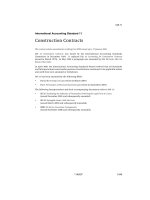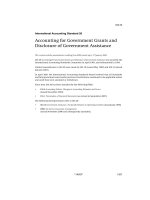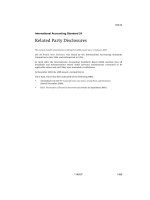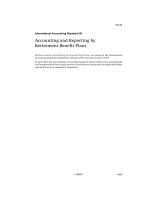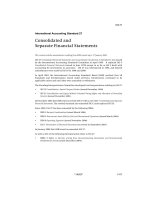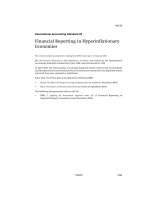chuẩn mực kế toán quốc tế ias 18
Bạn đang xem bản rút gọn của tài liệu. Xem và tải ngay bản đầy đủ của tài liệu tại đây (65.36 KB, 4 trang )
IAS 18
Case Study 1
Facts
Big Bulk has arrangements with its customers that, in any 12-month period ending March 31, if
they purchase goods for a value of at least $1 million, they will receive a retrospective discount
of 2%. Big Bulk’s year-end is December 31, and it has made sales to a customer during the
period April 1 to De-cember 31 of $900,000.
Required
How much revenue should Big Bulk recognize?
Case Study 2
Facts
Nice Guy Inc. sells goods with a cost of $100,000 to Start-up Co. for $140,000 and a credit
period of six months. Nice Guy Inc.’s normal cash price would have been $125,000 with a credit
period of one month or with a $5,000 discount for cash on delivery.
Required
How should Nice Guy Inc. measure the income from the transaction?
Case Study 3
Facts
Full Service Co. sells some equipment, the cash price of which is $100,000, for $140,000 with a
com-mitment to service the equipment for a period of two years, with no further charge.
Case Study 4
Facts
Bespoke Inc. has manufactured a machine specifically to the design of its customer. The machine
could not be used by any other party. Bespoke Inc. has never manufactured this type of machine
before and expects a number of faults to materialize in its operation during its first year of use,
which Bespoke Inc. is contractually bound to rectify at no further cost to the customer. The
nature of these faults could well be significant. As of Bespoke Inc.’s year-end, the machine had
been delivered and installed, the cus-tomer invoiced for $100,000 (the contract price), and the
costs incurred by Bespoke Inc. up to that date amounted to $65,000.
Required
How should Bespoke Inc. recognize this transaction?
Case Study 5
Which of the following situations signify that “risks and rewards” have not been transferred to
the buyer?
(a) XYZ Inc. sells goods to ABC Inc. In the sales contract, there is a clause that the seller has an
obligation for unsatisfactory performance, which is not governed by normal warranty provi-
sions.
(b) Zeta Inc. shipped machinery to a destination specified by the buyer. A significant part of the
transaction involves installation that has not yet been fulfilled by Zeta Inc.
(c) The buyer has the right to cancel the purchase for a reason not specified in the contract of
sale (duly signed by both parties) and the seller is uncertain about the outcome.
MULTIPLE-CHOICE QUESTIONS
1. “Bill and hold” sales, in which delivery is de-layed at the buyer’s request but the buyer
assumes title and accepts invoicing, should be recognized when
(a) The buyer makes an order.
(b) The seller starts manufacturing the goods.
(c) The title has been transferred but the goods are kept on the seller’s premises.
(d) It is probable that the delivery will be made, payment terms have been established, and the
buyer has acknowledged the delivery in-structions.
2. ABC Inc. is a large manufacturer of machines. XYZ Ltd., a major customer of ABC Inc., has
placed an order for a special machine for which it has given a deposit of 112,500 to ABC Inc.
The parties have agreed on a price for the machine of 150,000. As per the terms of the sales
agreement, it is an FOB (free on board) contract and the title passes to the buyer when
goods are loaded onto the ship at the port. When should the revenue be recognized by ABC
Inc.?
(a) When the customer orders the machine.
(b) When the deposit is received.
(c) When the machine is loaded on the port.
(d) When the machine has been received by the customer.
3. Revenue from an artistic performance is recognized once
(a) The audience register for the event online.
(b) The tickets for the concert are sold.
(c) Cash has been received from the ticket sales.
(d) The event takes place.
4. X Ltd., a large manufacturer of cosmetics, sells merchandise to Y Ltd., a retailer, which in
turn sells he goods to the public at large through its chain of retail outlets. Y Ltd. purchases
merchandise from X Ltd. under a consignment contract. When should revenue from the sale of
merchandise to Y Ltd. be recognized by X Ltd.?
(a) When goods are delivered to Y Ltd.
(b) When goods are sold by Y Ltd.
(c) It will depend on the terms of delivery of the merchandise by X Ltd. to Y Ltd. (i.e., CIF
[cost, insurance, and freight] or FOB).
(d) It will depend on the terms of payment be-tween Y Ltd. and X Ltd. (i.e., cash or credit).
5. M Ltd, a new company manufacturing and sell-ing consumable products, has come out with
an offer to refund the cost of purchase within one month of sale if the customer is not satisfied
with the product. When should M Ltd. recognize the revenue?
(a) When goods are sold to the customers.
(b) After one month of sale.
(c) Only if goods are not returned by the cus-tomers after the period of one month.
(d) At the time of sale along with an offset to revenue of the liability of the same amount
for the possibility of the return.
6. Micrium, a computer chip manufacturing com-pany, sells its products to its distributors for
onward sales to the ultimate customers. Due to frequent fluc-tuations in the market prices for
these goods, Micrium has a “price protection” clause in the distributor agreement that entitles it
to raise additional billings in case of upward price movement. Another clause in the
distributor’s agreement is that Micrium can at any time reduce its inventory by buying back
goods at the cost at which it sold the goods to the distributor. Dis-tributors pay for the goods
within 60 days from the sale of goods to them. When should Micrium recog-nize revenue on
sale of goods to the distributors?
(a) When the goods are sold to the distributors.
(b) When the distributors pay to Micrium the cost of the goods (i.e., after 60 days of the
sale of goods to the distributors).
(c) When goods are sold to the distributor pro-vided estimated additional revenue is also
booked under the “protection clause” based on past experience.
(d) When the distributor sells goods to the ulti-mate customers and there is no uncertainty with
respect to the “price protection” clause or the buyback of goods.
7. Company XYZ Inc. manufacturers and sells stan-dard machinery. One of the conditions in the
sale contract is that installation of machinery will be un-dertaken by XYZ Inc. During December
2005, XYZ received a special onetime contract from ABC Ltd. to manufacture, install, and
maintain customized ma-chinery. It is the first time XYZ Inc. will be producing this kind of
machinery, and it is expecting numerous changes that would need to be made to the machine
after the installation is completed, which one period is described in the contract of sale as the
“maintenance period.” The total cost of making the changes during the maintenance period
cannot be reasonably esti-mated at the time of the installation. When should the revenue from
sale of this special machine be recog-nized?
(a) When the machinery is produced.
(b) When the machinery is produced and deliv-ered.
(c) When the installation is complete.
(d) When the maintenance period as per the contract of sale expires.

